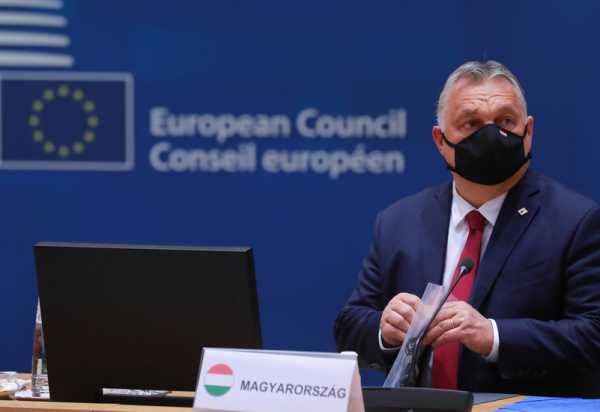
Viktor Orban, masked, at a previous EU summit. Under his leadership, Fidesz has embarked on a decade-long effort to chafe at democratic norms, such as judicial independence, minority rights, and freedom of expression and association (Photo: Council of the European Union)
As the world continues to seek productive ways to provide assistance to the beleaguered citizens of Ukraine, the Hungarian government is now using the humanitarian crisis to further its own authoritarian ambitions.
On 3 May 3, 2022, Hungary’s minister of justice submitted the 10th amendment of Hungary’s Constitution (also known as the Fundamental Law) to parliament with one crucial change: a new “special legal order” empowering the government to declare a state of emergency “in the event of [an] armed conflict, war or humanitarian catastrophe in a neighbouring country.”
With an active war in a bordering nation, the amendment would presumptively authorise the government to supersede parliament and issue laws by decree that restrict civil and political rights.
International actors, including the European Union, should view the expansion of executive authority with apprehension given the openly anti-democratic aims of Hungary’s dominant right-wing political party, the Hungarian Civic Alliance (Fidesz).
Under the leadership of Viktor Orbán, the party has embarked on a decade long effort to chafe at democratic norms, such as judicial independence, minority rights, and freedom of expression and association.
There are indeed legitimate reasons for declaring public emergencies as citizens must occasionally accept reasonable and well-tailored restrictions to fundamental rights in exchange for the expeditious and effective management of grave national emergencies.
However, Hungary’s actions must be contextualised within its recent history of using transnational crises as pretexts to restrict human rights.
Most prominently, in the last two years the government has repeatedly declared a “state of danger” due to the Covid-19 pandemic and took advantage of their expanded powers to issue heavy-handed restrictions clearly aimed at curbing political dissent.
These included the criminalisation of freedom of expression, as one could be fined or imprisoned for the ill-defined act of disseminating false information “capable of obstructing the efficiency of protection efforts,” and the imposition of new obstacles on media freedom, as the government restricted the ability of the independent press to report on the pandemic from hospitals.
Using Covid to clamp down
Further, while many countries reasonably abridged the right of assembly to limit the spread of the pandemic, Hungary has used its emergency powers to limit gatherings as a ploy to target political opposition.
For instance, in 2020, a neo-Nazi rally was held without police interference in an open public square, despite the fact that Covid-19 precautions were not followed; in contrast, when opposition and independent MPs organised a ‘car’ demonstration against pandemic-related restrictions, the government levied hefty fines against the protesters even though they remained in their vehicles and followed social distancing guidelines.
While the current national state of emergency is in place until 1 June, 2022, it is untenable for the government to continue to justify the current special order based on the pandemic, as nearly all Covid-related restrictions have already been lifted.
Now, Fidesz is seeking to adopt a constitutional amendment authorising a state of emergency based upon a war in Ukraine that may continue for years.
It is apparent why Fidesz prefers acting through emergency procedures even with a large parliamentary majority: ruling by executive decree carries little political risk, as there are no debates on legislative proposals during which an opposition party can play an important role in shaping public opinion.
Instead, decrees can be adopted in the shadows and target bedrock democratic rights, beyond the extent permitted under normal circumstances.
While Orbán would undoubtedly maintain that rule of law still exists in Hungary, the government’s intention to amend the constitution is clearly meant to shroud Fidesz’s authoritarian actions under the cloak of legality.
In reality, rule of law means more than an exercise of public power that is formally in line with the constitution; it means that the judicial system and constitution serve as effective boundaries for the executive branch.
This begs the question: has a national state of emergency becomes the new normal in Hungary?
Given recent developments, one must answer this question affirmatively, unless and until Hungary’s Constitutional Court and the European Union thwart Hungary’s executive overreach.
Thus far, the Constitutional Court has shirked its obligation to serve as an effective check on the arbitrary imposition of executive power. In politically-sensitive cases, where the constitutionality of executive decrees had been reviewed, the court deliberately delayed adjudicating the lawsuits until the expiry of the decrees, resulting in the dismissal of complaints on procedural rather than substantive grounds.
The European Union seems to offer a more promising venue for action, and most recently the EU Commission took the significant step of triggering Article 7 of the EU Treaty, which would hold Hungary responsible for a “systemic deficiency” in the rule of law.
As the commission’s proceedings on Hungary are set to begin, the consequences of Fidesz’s actions cannot be ignored by the EU if the rule of law is considered to be a shared value of its member states.
Hungary’s human rights activists will continue to monitor legal developments, document the dismantling of democracy and perform a critical watchdog function in instances involving abuses of power.
However, without a supportive EU and European community of nations, not only will the Hungarian government continue its power grab, but other states in the region will be emboldened to follow down the same dark path of authoritarianism.
Source: euobserver.com



